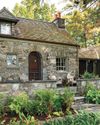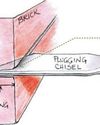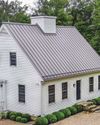
The Queen Anne house was completed in 1899 for New Albany’s prominent businessman and benefactor Louis N. Hartman (1838–1917) and his third wife, Annie Katherine “Katie” Kunz. With its distinctive corner tower, it is believed to be a pattern-book plan by the Knoxville, Tennessee, architect George F. Barber. The house contains a profusion of oak, cherry, and butternut woodwork, parquet floors, and stained and beveled glass. The second floor’s walnut and oak flooring squares were manufactured by New Albany’s Wood Mosaic Company. Woodwork may have been milled at the Oak Street Planing Mill owned by Philip Schneider, father of Annie Katherine Kunz.
Hartman was a German immigrant active in the Methodist church. While wealthy owners were by then building on Main Street, he chose to build on the site of his original family home, in a segregated neighborhood. Local tradition and his obituaries maintain that Hartman was a lifelong advocate for African– Americans struggling in the post-Reconstruction era.
This story is from the October - November 2020 edition of Old House Journal.
Start your 7-day Magzter GOLD free trial to access thousands of curated premium stories, and 9,000+ magazines and newspapers.
Already a subscriber ? Sign In
This story is from the October - November 2020 edition of Old House Journal.
Start your 7-day Magzter GOLD free trial to access thousands of curated premium stories, and 9,000+ magazines and newspapers.
Already a subscriber? Sign In

faded luxe IN A RETURN TO SAVANNAH
Residents of the Blue Ridge Mountains find their city home in a converted commercial building in beautiful Savannah, Georgia.

a hudson valley VERNACULAR
When Harlan Bratcher started looking for a country house in New York, in 1990, he knew what he wanted-something peaceful and serene, an escape from the hectic lifestyle of Manhattan.

the Dr. Mills house RESTORED
In rural Washington State, a dedicated couple bring back a 1912 bungalow that once had been the town's hospital.

The Right Masonry Tool for Repointing
The mortar between individual bricks or stones begins to erode after many years. That might be attributed to rain and wind, leaky gutters, building settlement, or such chemical agents as de-icing salts.

How To Remove Wallpaper
There's more than one way to do it; try them all until you find what works for your situation.

living with PLASTICS anxiety
Plastics are ubiquitous in modern life. Even houses built long before vinyl caught on are now full of polymer-based products, from the hoses in pull-down faucets to plastic light switches. Now that we know exposure to certain plastics can be hazardous to human health, we need guidance on how to evaluate building products for potential impacts.

homey Craftsman Textiles today
For bungalows, Craftsman houses, and Tudors that might have rather severe woodwork and furniture, textiles are a critical part of the decorative scheme.

Navigating the Lumberyard - Here's some lumber lingo you should know before you venture into a lumberyard.
Here's some lumber lingo you should know before you venture into a lumberyard. Almost everyone fixing an old house will end up at a lumberyard-whether it's a local supplier or the organized aisles of a big-box home-improvement store.

a farmhouse renewed
Sensitive renovations and restoration work preserved a house that dates to 1799.

AN OVERVIEW OF METAL ROOFING
METAL ROOFS ARE RESURGENT, FOR GOOD REASONS.